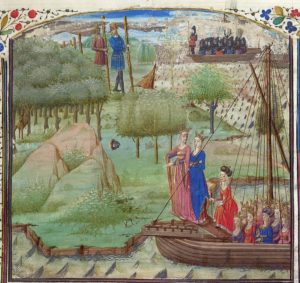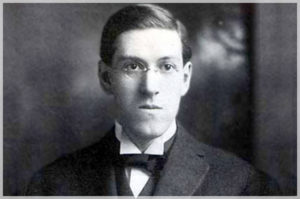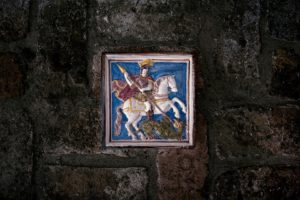In which a violent Turk slaughters some giants, and steals their land, at which point H P Lovecraft decides he likes the English, but doesn’t know what he’s talking about…
So, there was this guy called H P Lovecraft. He came from New England and at one time declared I am Providence. And he wrote some rather interesting creepy stories which didn’t get that much attention at the time. Despite this, they were unusual enough to capture certain imaginations, and now we have a whole world of Lovecraftian wonders. Seems all right so far…
Unfortunately, Lovecraft had views about stuff, and he wrote those views down. An impoverished xenophobe, he got unpleasant at times, and expressed Horrid Ideas about people who weren’t from nice, decent white stock (though he even thought certain white folk were trash). He was a racist, though it can sometimes be hard to unpack that from his general xenophobia and collection of hang-ups. Or even self-hatred. We feel a bit sorry for him, in some ways. Anyhow, he said things, then we said things, and no one was entirely happy. Though he still wrote some good stories.
We could live with HPL himself – he happened, he’s gone now – except for the regular unearthing of his sentiments by people who have even less of a clue that HPL did about the real world. Or about Britain, England, and all that jazz. As Britlanders ourselves, we would like to employ a solid Yorkshire boot to some of the concepts involved in Lovecraft’s Anglophily. Then maybe at least some people will stop droning on about Anglo-Saxons and their values in the nonsensical way that Lovecraft did, or using it for racist propaganda.
It Gets Verse
One of the silly things about racism is the way in which people base their views on idiotic concepts of purity, genetic cleanliness, mythical peoples and all that lunacy. And dear old England is often the focus of these ill-conceived ventures. The dreaded Anglo-Saxon supremacy idea. Lovecraft himself was an Anglophile of the poetic, we’ll have no real knowledge here, sort, and he has plenty of descendants, sadly.
Let’s have a look at the old gent’s verse for an anchor-point. For example, ‘An American to Mother England’, from 1916:
“Whilst nameless multitudes upon our shore
From the dim corners of creation pour,
Whilst mongrel slaves crawl hither to partake
Of Saxon liberty they could not make,
From such an alien crew in grief I turn,
And for the mother’s voice of Britain burn…”
Poesy, 1916
This is the sort of utter cod (content-wise) that makes you wonder how you’re supposed to enjoy Call of Cthulhu. We can add in ‘Lines On General Robert Edward Lee’ (1917), which also goes over the top:
“Attend! ye sons of Albion’s ancient race,
Whate’er your country, and whate’er your place;
LEE’S valiant deeds, though dear to Southern song,
To all our Saxon strain as well belong,
Courage like his the parent Island won,
And led an Empire past the setting sun;
To realms unknown our laws and language bore,
Rais’d England’s banner on the desert shore;”
The Coyote, January 1917
Considering how well-read Lovecraft was, he clearly didn’t have much of a grounding in early English or Saxon history. Saxon liberty? He doesn’t seem to have had much of a clue about where it all came from – and didn’t want to, we suspect.
The truth is that Britain is a cobbled-together entity, formed by a series of violent, often pagan, invaders and immigrants. Every tribe and group tried to knee every other tribe and group in the groin. Its name alone is a minefield. The Romans borrowed Greek words for it, drawing on ‘Prettanike’ (Britannic), used by Pytheas in the 4th Century BCE; imaginative early writers decided that it came from the line of Aeneas. And anyway, ‘Britons’ meant the Welsh, not the rest of the various tribes and populations.

The best-known fun account of the origin of Britain is probably that given by the 12th-century chronicler Geoffrey of Monmouth in his Historia Regum Britanniae. And Geoffrey was either Welsh (not Saxon) or Breton/Norman (not Saxon).
“Brutus! there lies beyond the Gallic bounds
An island which the western sea surrounds,
By giants once possessed, now few remain
To bar thy entrance, or obstruct thy reign.
To reach that happy shore thy sails employ
There fate decrees to raise a second Troy
And found an empire in thy royal line,
Which time shall ne’er destroy, nor bounds confine.”
Geoffrey of Monmouth, On the Deeds of the Britons (1136)
Brutain Vetoed as New Name
Brutus, or Brute of Troy, was a legendary descendant of the Trojan hero Aeneas, as mentioned above. It’s a story which first appears in the Historia Britonum, an anonymous 9th-century historical compilation to which commentary was added by Nennius (who made most things up anyway).
Lovecraft’s word ‘Albion’ comes from the Greek, possibly “island of the Albiones”, from the 6th century BCE. This refers to the main chunk, not Ierne, or Ireland. So it’s anyone’s guess as to what ‘Albion’s ancient race’ might be, and why Lovecraft might cry out in admiration. We can offer you some contenders:
- The Giants who Brute slaughtered to steal control of the islands. That’s Brute who was descended from Trojan Anatolian stock, so we’re talking Turkish/Greek oppression here.
- The Britons, who, when they weren’t fighting each other for various kingdoms, fought a losing battle against pagan invaders (Germans) and ended up being shoved onto the edges of their own land (or possibly not theirs).
- The Romans (Italians), who either fought everyone or paid them to form auxiliary legions and do in their own people on Rome’s behalf.
- The Saxons (plus Angles, Frisians & Jutes), who swamped the isles through slaughter and waves of immigration, taking our jobs and raping our goats.
- The Normans (French) who did the same thing but with castles, crushed the Saxons and also burned down Yorkshire, the bastards.
Nennius helpfully adds that subsequent to Brute wiping out the large natives,
“After an interval of not less than eight hundred years, came the Picts, and occupied the Orkney Islands: whence they laid waste many regions, and seized those on the left hand side of Britain, where they still remain, keeping possession of a third part of Britain to this day. Long after this, the Scots arrived in Ireland from Spain.”
We’d be interested to know which of these the old gent admired the most.
Natives Welcome Benevolent Anglo-Saxon Masters
As HPL seems especially fixated on the Saxons, we can remind people of their noble virtues. A notable leader of theirs, Hengist came from a line of Germanic pagans, whose forebear was:
“The offspring of one of their idols, and whom, blinded by some demon, they worshipped according to the custom of the heathen.”
According to the Anglo-Saxon Chronicles, Hengist, with brothers and gang in tow, came to Britain in 449 CE as mercenaries, decided the Britons were worthless, and sent home for some major waves of uninvited immigrants.
“After this the barbarians became firmly incorporated, and were assisted by foreign pagans; for Vortigern was their friend, on account of the daughter of Hengist, whom he so much loved, that no one durst fight against him__in the meantime they soothed the imprudent king, and whilst practicing every appearance of fondness were plotting with his enemies. And let him that reads understand, that the Saxons were victorious, and ruled Britain, not from their superior prowess, but on account of the great sins of the Britons: God so permitting it.”
Nennius
The fine, outstanding Saxons then betrayed everybody and knifed their best friends without warning to get what they wanted:
“The king with his company, appeared at the feast; and mixing with the Saxons, who, whilst they spoke peace with their tongues, cheerished treachery in their hearts, each man was placed next his enemy. After they had eaten and drunk, and were much intoxicated, Hengist suddenly vociferated, “Nimed eure Saxes!” and instantly his adherents drew their knives, and rushing upon the Britons, each slew him that sat next to him, and there was slain three hundred of the nobles of Vortigern.”
Gildas, in the mid-5th century CE, wrote about the Saxons’ civilising influence:
“Lamentable to behold, in the midst of the streets lay the tops of lofty towers, tumbled to the ground, stones of high walls, holy altars, fragments of human bodies, covered with livid clots of coagulated blood, looking as if they had been squeezed together in a press; and with no chance of being buried, save in the ruins of the houses, or in the ravening bellies of wild beasts and birds; with reverence be it spoken for their blessed souls, if, indeed, there were many found who were carried, at that time, into the high heaven by the holy angels…
“Some, therefore, of the miserable remnant, being taken in the mountains, were murdered in great numbers; others, constrained by famine, came and yielded themselves to be slaves for ever to their foes, running the risk of being instantly slain, which truly was the greatest favour that could be offered them…”
Ah, HPL’s beloved Saxon values. Remember, these were the values which led to people who “Rais’d England’s banner on the desert shore.”
That would be the British flag, or perhaps the Cross of St George, so prized by English racists who also have no idea about history. Particularly as St George was most probably a Greek working as a soldier or official in the Roman army; a Greek from Cappadocian stock (Anatolia and Turkey again) and Syria Palestina (oh no, the Middle East).
To help any culturally intolerant dipsticks, we can add that the association of Saint George with the red-on-white probably first arose in Genoa, which had adopted the colours for their flag and George as their patron saint in the 12th century. Those untrustworthy Italians – not even Teutonic!
Everybody Loses
We can therefore summarise that Lovecraft wrote in ardent praise of a group of unwelcome, back-stabbing, pagan Germanic immigrants. After fighting each other and sundy Vikings for subsequent control of the land, they flourished to become a people who were soundly and utterly beaten by some French immigrants (the Normans), and who all united under a Greek/Turkish saint’s flag adopted by Italians. And when HPL wrote
“The hedge-lin’d lane, that leads to rustic cot
Where sweet contentment is the peasant’s lot;
The mystic grove, by Druid wraiths possess’d,
The flow’ring fields, with fairy-castles blest…”
he was presumably being ironic. The peasant’s lot was mostly one of dirt, oppression and impoverishment as bad as Lovecraft’s. The druids, such as they were if you ignore Victorian re-invention, were wiped out by Italians and Germans. Then the Normans built their less-than-fairy castles on top of everyone so that they could control the lot. Their idea of Saxon or Anglo-Saxon values was counting up how many pigs people had, and how much profit could be made. Or stealing the pigs.
We like a lot of Lovecraft’s work. We’re not ashamed to be from Britain, and we’re proud of being from Yorkshire. But we’re not idiots. HPL’s ‘Saxon strain’ is more like a mongrel with a hernia, whilst the ‘sons of Albion’ need to read more real history and learn how to be kind…



Nice piece of work and utterly agreeable. Wiliam the Konk, who was known at the time as William the Bastard was of course a Norman and the Norman’s were Vikings, so as a race they have had a pretty good crack at the Isles of England over a good few centuries.